Dow and S&P Stock Market Indices Range Bound, Nasdaq in Bullish Breakout
Stock-Markets / Stock Markets 2013 Sep 12, 2013 - 08:32 AM GMT The “Syrian Conflict pullback” is over and the market is back in bullish mode, particularly the NASDAQ which has just given a bullish breakout signal.
The “Syrian Conflict pullback” is over and the market is back in bullish mode, particularly the NASDAQ which has just given a bullish breakout signal.
For the third time the 1480’ish level on the Dow Transports has held. With this support holding, the bull trend is back in business on the Industrials the Transports and the S&P. However, they are range bound.
Within this apparent overall strength however there is much technical weakness about when you start to drill down a bit into specific stocks, particularly consumer staples. This development is causing me to worry somewhat and indicates that all is not completely “rosy” in the economic fundamental garden.
For example of the 10 top holding in the bell-weather consumer staples ETF: XPL, 5 are trading at or below their 100 DMA (PG, PEP, CVS, CL and MO) and another 3 are trading at or below their 200 DMA (KO, PM and WMT). Apparently this technical weakness is due to bad guidance moving forward which is not a good omen for the health of the overall world economy. This may also explain why so many companies, in the broader market, are trading below recent highs. Thus caution is warranted.
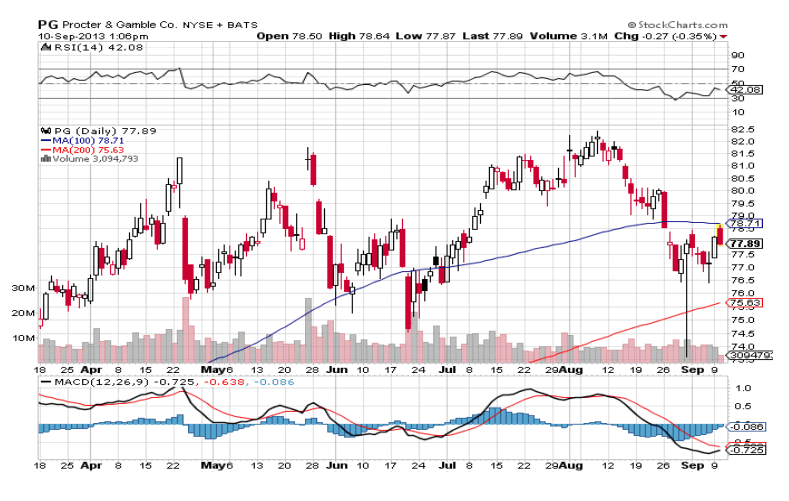
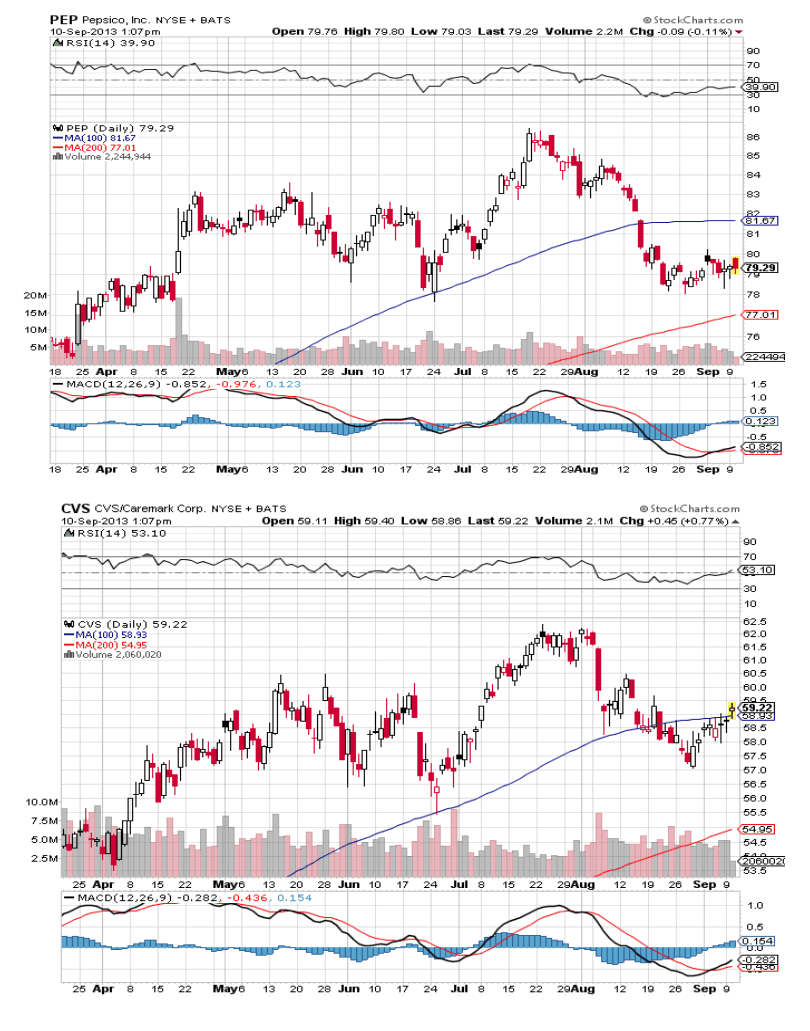
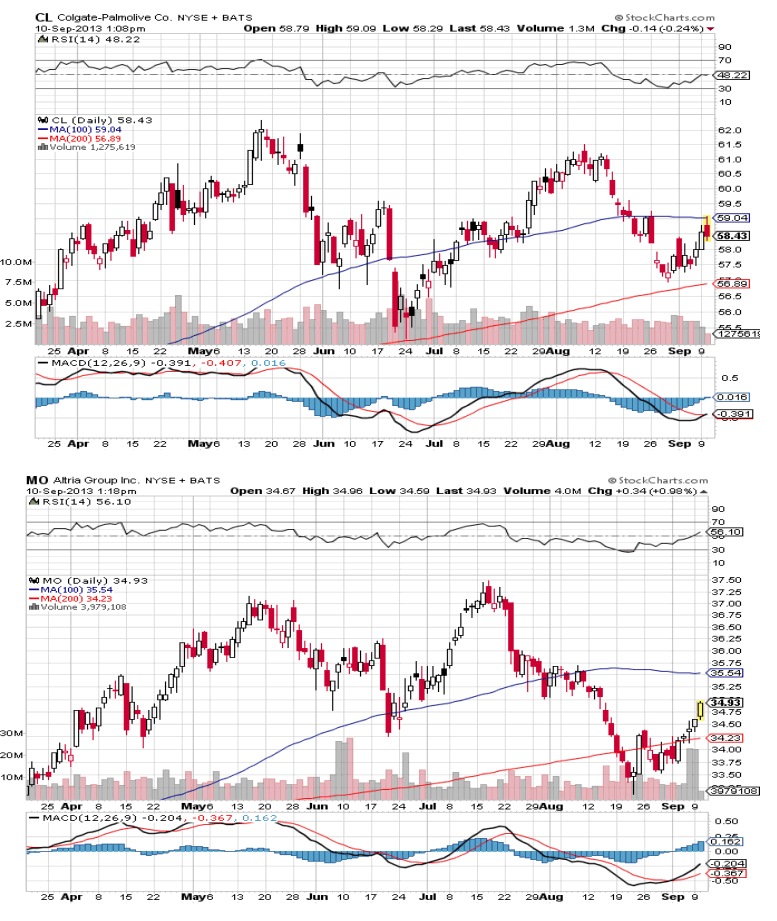
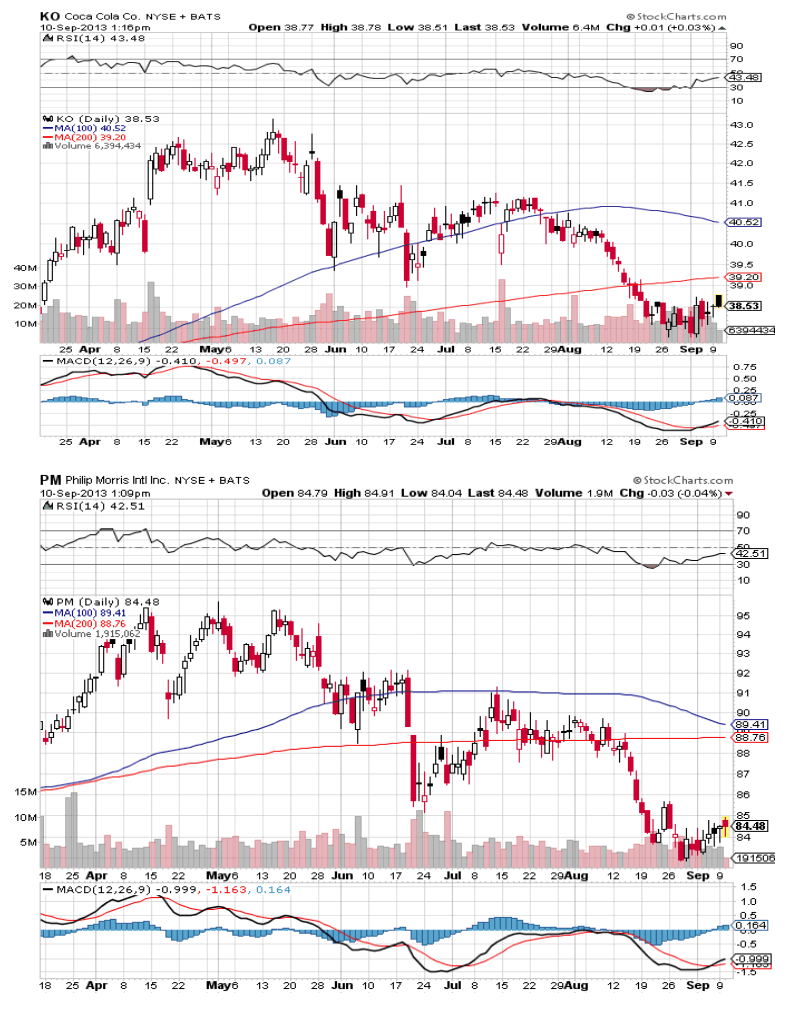
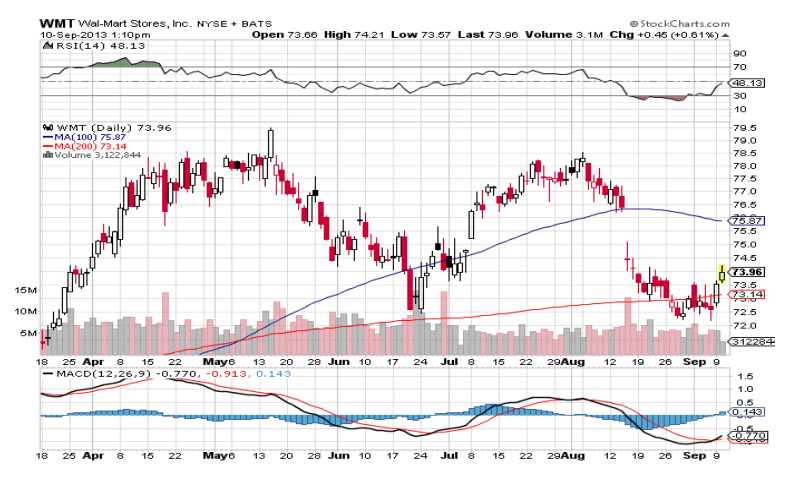
A German calm before a European storm.
Even with the slight prospect of a war breaking out between Syria and America there is an eerie calm around Europe. There is one reason for this and one reason alone: the German Federal elections to be held on 23rd. September. As Ulrich Beck of the Guardian reported:
“It may look as if the chancellor is dozing on the volcano of the European crisis: but that will all change if she wins a third term
With Germany's federal elections taking place in late September, a visitor to Berlin these days might expect the city to be raging with debate on Europe. Surely the streets are alive with Eurosceptics wailing for the return of the mark and impassioned Europeans demanding "ever closer union". In fact, Germany is oddly detached. So far the campaign has focused on US intelligence surveillance, the rising cost of energy and childcare facilities. Military intervention in Syria may become an issue – but that's it.
In Sunday night's TV debate, Angela Merkel, the Christian Democrat chancellor and her main opponent, Peer Steinbrück of the Social Democrats, came out more or less equal (though polls show that Steinbrück performed better at convincing previously undecided voters – which are still as many as one in three). Europe was one of the first items on the agenda, yet both candidates seemed eager to move on to more comfortable terrain. Germany, the key to solving the euro crisis, seems immune to a truly polarising dispute over alternatives, especially since none are available for free.
Since the start of the crisis, many governments across Europe have been swept from power. Germany's, on the other hand, has never looked more secure. Germans love Merkel. Why? Because she asks little of them. And because Merkel is practicing a new style of power politics in Europe, which I have called Merkiavellism: a combination of Machiavelli and Merkel. "Is it better to be loved or feared?" Machiavelli inquired in The Prince. His answer was that "one ought to be both feared and loved, but as it is difficult for the two to go together, it is much safer to be feared than loved, if one of the two has to be wanting".
Merkiavelli is applying this principle in a new way. She is to be feared abroad, and loved at home – perhaps because she has taught other countries to fear. Brutal neoliberalism to the outside world, consensus with a social democratic tinge at home – that's the successful formula that has enabled Merkiavelli constantly to expand her own position of power and that of Germany as well.
There's a striking discrepancy concerning the positions of executive elites and political parties too. In most European countries there are strong Eurosceptic movements and parties giving the increasingly restless citizenry a voice. To them the austerity politics imposed by their governments are monstrous acts of injustice. They are losing their last spark of hope and trust in politics.
This, again, is not the case in Germany. Here we find a rare state of consensus. The Social Democrats and the Greens may be challenging the detail of Merkel's austerity programmes, but have so far always voted with her in parliament. Meanwhile, two of the parties that form Merkel's government – the Bavarian CSU and the liberal FDP – are remarkably distant from the position of Merkel's party. As a result the German debate on the eurozone crisis takes place without an opposition in parliament.
In the real world, meanwhile, the European crisis is coming to a head, and Germany finds itself faced with a historic decision. It must attempt either to revive the dream and poetry of a political Europe in the imagination of the people, or to stick with a policy of muddling through and of using hesitation as a means of coercion – until the euro do us part. Germany has become too powerful to be able to afford the luxury of indecision and inactivity. But Germany is sleep-walking down its own special path. As Jürgen Habermas puts it: "Germany isn't dancing. It's dozing on a volcano".
And there is a final paradox: even if Germany is dozing on a volcano, even if there is no discussion on the moment of decision, the most likely outcome of the elections is going to be in favour of the next step towards a political EU. This is because most likely Merkel will return to the chancellery for a third term. Under her, I expect that there will be a silent turn to a politics of more Europe: switching positions is the key element of Merkiavelli's power politics. In the unlikely event that Merkel won't be re-elected, a red-green government would take the initiative, together with France, Italy, Spain, Poland etc, to correct the design flaw of European monetary union and take the next step in completing the political union: producing a situation in which Merkel, in opposition, constitutes the informal part of a "grand coalition".
Thus look out for events in Europe and indeed the rest of the “free world” to speed up considerably post September 23rd. If you think the last 5 years were a roller-coaster for European austerity you ain’t seen nothing yet, the real pain has yet to start.
Trading wise, I reckon the direction the market takes following the October earnings season will be significant for the medium to long term. For this reason I advise clients to keep their powder dry and not follow the bull herd heedlessly but rather trade specific technical signals. At the moment those signals are mixed.
Charts courtesy of StockCharts.Com
By Christopher M. Quigley
B.Sc., M.M.I.I. Grad., M.A.
http://www.wealthbuilder.ie
Mr. Quigley was born in 1958 in Dublin, Ireland. He holds a Bachelor Degree in Accounting and Management from Trinity College Dublin and is a graduate of the Marketing Institute of Ireland. He commenced investing in the stock market in 1989 in Belmont, California where he lived for 6 years. He has developed the Wealthbuilder investment and trading course over the last two decades as a result of research, study and experience. This system marries fundamental analysis with technical analysis and focuses on momentum, value and pension strategies.
Since 2007 Mr. Quigley has written over 80 articles which have been published on popular web sites based in California, New York, London and Dublin.
Mr. Quigley is now lives in Dublin, Ireland and Tampa Bay, Florida.
© 2013 Copyright Christopher M. Quigley - All Rights Reserved
Disclaimer: The above is a matter of opinion provided for general information purposes only and is not intended as investment advice. Information and analysis above are derived from sources and utilising methods believed to be reliable, but we cannot accept responsibility for any trading losses you may incur as a result of this analysis. Individuals should consult with their personal financial advisors before engaging in any trading activities.
Christopher M. Quigley Archive |
© 2005-2022 http://www.MarketOracle.co.uk - The Market Oracle is a FREE Daily Financial Markets Analysis & Forecasting online publication.



